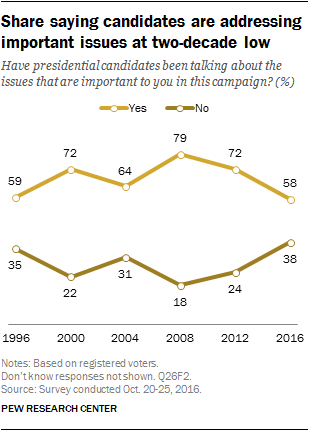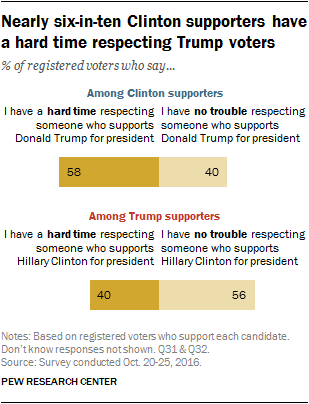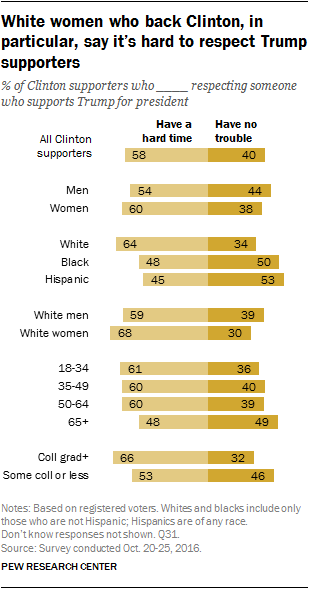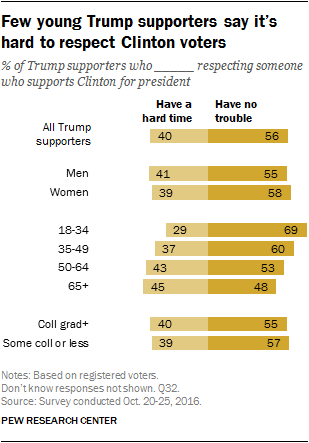
With a few weeks to go in a 2016 presidential campaign that has witnessed a fair amount of mudslinging, most registered voters (54%) say that “personally insulting political opponents is never fair game” in politics, while 43% say personal insults are “sometimes fair game.”
Six-in-ten Clinton supporters (60%) consider personal insults out of bounds in politics and elections, while 38% say they are sometimes acceptable. In contrast, about half of Trump backers (51%) say that personal insults are sometimes acceptable (44% say they never are).
Among all voters, women (60%) are more likely than men (48%) to think that personal insults in politics are off-limits. The gender gap is particularly pronounced among Trump backers; 59% of men who support Trump say insulting political opponents is sometimes fair game, compared with just 41% of women who back him.
The share of voters who say personal attacks on political opponents are sometimes acceptable has increased since earlier in the campaign: In March, 30% said such personal attacks were sometimes fair game; 43% say this today.

Both Democratic and Republican voters are now more accepting of personal attacks than they were six months ago. Still, most Democratic and Democratic-leaning registered voters continue to say personal insults are out of bounds (60% today, down from 74% in March). By comparison, Republican and Republican-leaning voters are now as likely to say personally insulting one’s opponent is sometimes fair game (48%) as they are to say it never is (48%). In March, six-in-ten Republican voters (60%) said insulting political opponents was never acceptable.
As was the case in March, Republicans who backed Trump in the GOP primary are more likely than those who supported other candidates to say personal insults may be fair game: 61% of Trump’s primary supporters view them as sometimes acceptable compared with 39% of Republican voters who supported a candidate other than Trump for the GOP nomination. There are no significant differences on this question between Democratic voters who backed Clinton and Sanders in the primary contest.
Trump’s tone viewed more negatively than other recent candidates

Though voters say campaign 2016 has been more negative than other recent elections, they are more critical of Trump’s tone than of Clinton’s. About six-in-ten voters (62%) say that Donald Trump has been “too personally critical” of Hillary Clinton in the presidential campaign so far, while 44% of voters say Clinton has been too critical of Trump.
The share saying Trump is too critical of Clinton is substantially higher than voters’ assessments of any other candidate – of either party – in elections going back more than two decades. By comparison, the share of voters saying Clinton is too critical of Trump is greater than the proportion saying this about Barack Obama’s treatment of both John McCain (22%) and Mitt Romney (35%), but less than the share saying John Kerry (52%) had been too critical of George W. Bush, and is on par with voters’ evaluations of several recent GOP candidates.
Many see key issues unaddressed in the campaign

Overall, 58% of registered voters say that the presidential candidates are talking about the issues that are important to them this campaign, while 38% say they are not.
The share of registered voters who say the candidates are talking about important issues is down significantly from recent elections. In 2008, 79% said the candidates were talking about important issues, and 72% said this in 2012. In Pew Research surveys over the previous five presidential elections, 1996 was the last time voter sentiment on this question was about as negative as it is in the current survey.
Trump supporters (68%) are more likely than Clinton supporters (58%) to say the candidates have been talking about issues that are important to them in this campaign.
Over the past several months, voters have expressed dissatisfaction with the campaign. Last month, for instance, 57% said they had been feeling “frustrated” by the campaign, while 55% said they were “disgusted.”
Most voters expect political divides to remain or increase

Voters are skeptical that either Clinton or Trump will repair political divisions in the country. Overall, 41% of voters say they expect political divisions in the country to increase if Clinton wins, while 48% say divisions will stay about the same and just 9% say they will decrease. A majority of voters (55%) expect divisions to increase if Trump wins, while 26% say they will stay about the same and 17% say they will decrease.
Clinton and Trump supporters have more positive expectations that their candidate, rather than their opponent, would heal the nation’s political divisions, but they are not very optimistic. Roughly two-thirds of Clinton supporters (66%) expect little change in political divisions if she takes office, while a quarter (25%) expect these divides to increase, and just 8% say her election would narrow the nation’s political divide.
Among Trump backers, more say political divisions would increase (33%) than decrease (20%) under his presidency, while 46% expect little change.
Clinton backers have a harder time respecting Trump’s supporters

A majority of Clinton supporters (58%) say they have a hard time respecting a person who supports Donald Trump for president while 40% say they have no trouble doing this. The balance of opinion is reversed among Trump backers: 56% say they have no trouble respecting someone who backs Clinton, while 40% say it’s difficult for them to respect someone who supports her.
There are significant demographic differences among Clinton supporters. Whites, women, college graduates and younger Clinton backers are more likely to express difficulty respecting those who decide to vote for Trump.

About two-thirds of white Clinton supporters (64%) say they have a hard time respecting Trump supporters, while only about a third (34%) say they have no trouble. Black and Hispanic Clinton voters are more divided on this question: 48% of black Clinton backers say they have a hard time, while roughly as many (50%) say they have no trouble respecting someone who supports Trump for president. The balance of opinion is roughly the same among Hispanic Clinton backers (45% vs. 53%, respectively).
And while there are no significant differences between women and men who support Clinton on this question, white women who support her are particularly likely to express personal difficultly respecting Trump supporters: 68% say this (compared with 59% of white men who back Clinton).
Clinton’s supporters who are 65 and older are somewhat less likely than their younger counterparts to say they have a hard time respecting Trump supporters (48% say this, compared with about six-in-ten of Clinton voters under 65).

Clinton voters who have college degrees find it harder than those who do not to respect people who are voting for Trump: 66% of college graduates who are voting for Clinton say they have a hard time respecting someone who votes for Trump, while just 32% say they have no problem doing this. Among those with less education, views are roughly split (53% hard time, 46% no problem).
Among Trump supporters there are more modest demographic differences, but younger Trump voters are more likely than older Trump backers to say they have no trouble respecting someone who supports Clinton: Nearly seven-in-ten Trump backers under 35 (69%) say this, along with six-in-ten Trump supporters ages 35-49 (60%). Among older Trump supporters opinion is more divided, with about half (51% of those 50 and older) saying they have no trouble respecting someone who supports Clinton. There are no significant educational or gender differences among Trump supporters on this question.